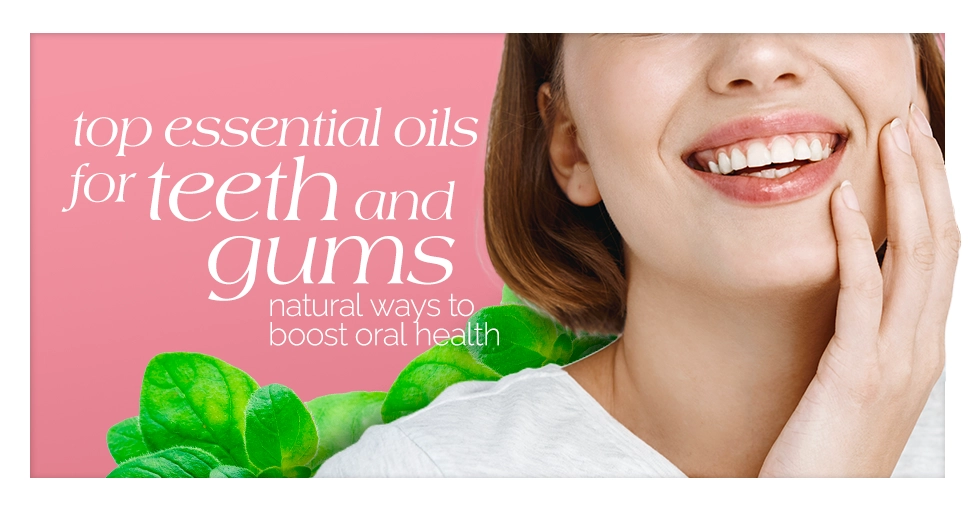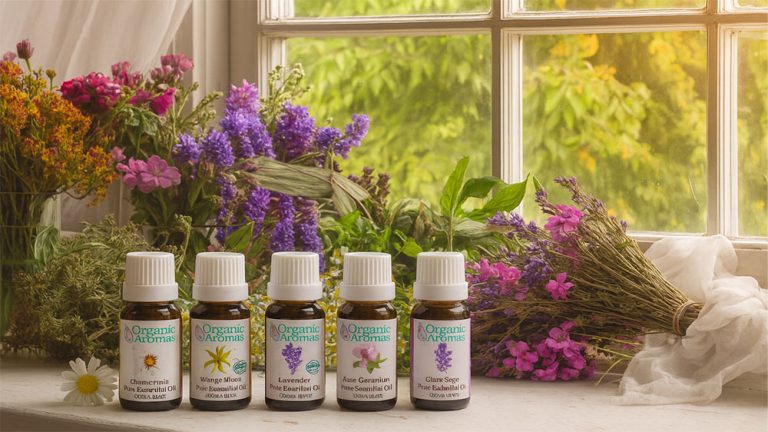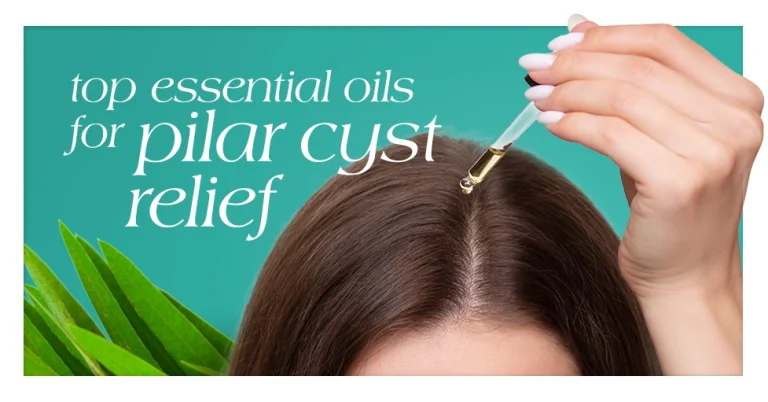Top Essential Oils for Teeth and Gums: Natural Ways to Boost Oral Health
When it comes to oral health, many wonder if nature provides. Can essential oils for teeth and gums really make a difference? Dive into the science and practice behind using essential oils like tea tree, peppermint, and clove to enhance your dental routine, offer relief, and promote gum health. This article cuts through the noise, providing actionable advice on integrating these oils into your oral hygiene program safely and effectively.
Dental Wellness: Harnessing the Power of Essential Oils for Teeth and Gums
- Essential oils like tea tree, peppermint, and clove have antimicrobial and anti-inflammatory properties that can enhance oral health when used in conjunction with regular dental care practices.
- Oil pulling with coconut or sesame oil can help reduce harmful bacteria, whiten teeth, and fortify overall oral defenses as part of a holistic oral hygiene routine.
- When using essential oils for oral care, safety precautions should be taken to avoid ingestion and ensure proper dilution to prevent toxicity and irritation.
Unlocking the Power of Essential Oils for Oral Care
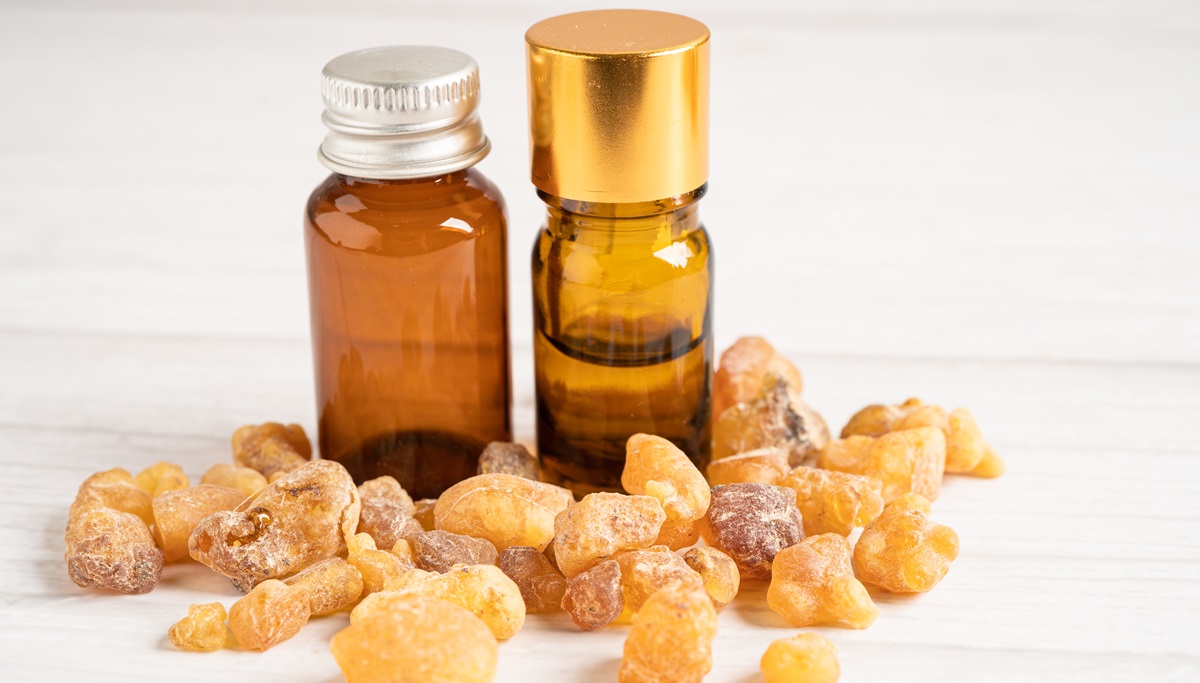
Essential oils are more than just pleasant scents; they are a fusion of healing, anti-inflammatory, and antibacterial properties that can significantly uplift your oral health. Imagine combating gum inflammation with the same ingredients that fill the air with their enchanting aromas. Essential oils such as:
- frankincense
- sage
- lemon
- peppermint
- tea tree
- clove
- eucalyptus
have been identified as powerful allies in maintaining healthy gums. Incorporating essential oils into your oral care routine taps into an ancient wisdom that modern science continues to support.
However, it’s important to balance this natural approach with the rigors of evidence-based dental care, particularly those practices that include fluoride to fortify teeth and gums. Essential oils should be viewed as complementary agents, enhancing your oral hygiene routine with their beneficial properties while not replacing core dental health practices.
The Science of Essential Oils for Inflammation in Oral Health
Essential oils have shown promise in reducing inflammation and supporting oral health through various mechanisms. Here’s a detailed look at how specific components in essential oils contribute to their anti-inflammatory properties and how they work in oral health:
Key Components and Their Actions
1. Eucalyptol (Eucalyptus Oil)
• Action: Eucalyptol exhibits anti-inflammatory properties by reducing the production of pro-inflammatory cytokines and enzymes such as COX-2. It helps in reducing gum inflammation and preventing periodontal disease.
• Mechanism: It inhibits the NF-κB pathway, which is a key player in the inflammatory response.
2. Thymol (Thyme Oil)
• Action: Thymol has been found to reduce gingival inflammation and prevent plaque formation due to its antiseptic properties.
• Mechanism: It disrupts the cell membranes of bacteria, reducing their viability and subsequent inflammation in the gums.
3. Menthol (Peppermint Oil)
• Action: Menthol provides a cooling effect and reduces inflammation and pain in the oral cavity.
• Mechanism: It works by desensitizing the sensory receptors and reducing the local inflammatory response.
4. Carvacrol (Oregano Oil)
• Action: Carvacrol shows significant anti-inflammatory and antimicrobial activities, making it effective against oral pathogens.
• Mechanism: It inhibits the expression of pro-inflammatory mediators and disrupts the bacterial cell wall.
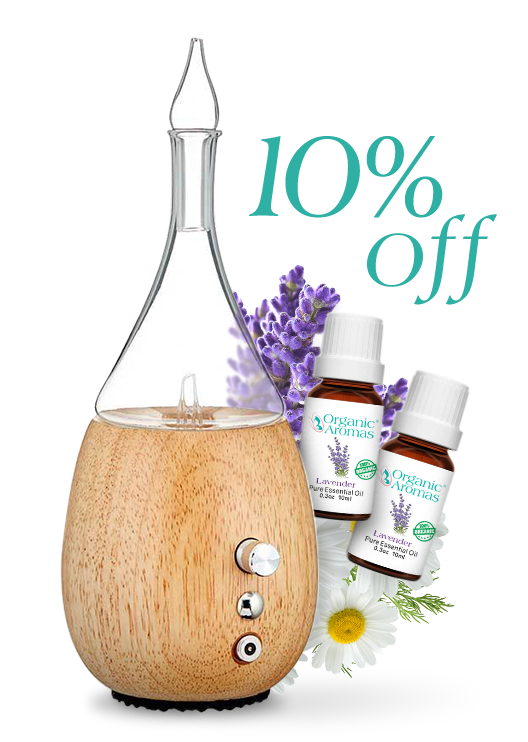
Join Now and Get a Coupon for 10% Off!
Evidence from Studies
1. Sage-Containing Mouthwash Study
• Study: A 6-week randomized controlled trial evaluated the anti-inflammatory potential of a sage-containing mouthwash in elderly subjects with periodontal disease.
• Findings: The study found a significant reduction in the Sulcus Bleeding Index (SBI) and Plaque Index (PLI), indicating reduced gingival inflammation1.
2. Systematic Review and Meta-Analysis
• Study: A systematic review compared the effects of essential-oils mouthwash (EOMW) to a vehicle solution (V-Sol) and water-based control (WC) on plaque and gingival inflammation.
• Findings: The EOMW showed significantly better plaque control and reduction in gingival inflammation compared to the V-Sol, highlighting the efficacy of essential oils in oral health2.
3. Essential Oils vs. Chlorhexidine
• Study: Another study compared the effects of an essential-oil-based oral rinse with chlorhexidine, a common antiseptic, as adjuncts to scaling and root planing in treating periodontal inflammation.
• Findings: Both treatments significantly reduced plaque, bleeding on probing, and probing pocket depth, demonstrating that essential oils can be as effective as chlorhexidine in managing periodontal health3Alshehri, M., Alshail, F., Aldosary, K., & Alamri, A. (2015). Comparison of an essential-oil-based oral rinse and chlorhexidine as adjuncts to scaling and root planing in the treatment of periodontal inflammation.. Interventional medicine & applied science, 7 2, 78-84[/efn_mote].
Mechanisms in Detail
• Inhibition of Pro-inflammatory Cytokines: Essential oils can suppress the production of pro-inflammatory cytokines like TNF-α, IL-1β, and IL-6, which are crucial in the inflammatory process.
• Antimicrobial Action: By reducing bacterial load in the oral cavity, essential oils help mitigate the source of inflammation, particularly in conditions like gingivitis and periodontitis.
• Modulation of Immune Response: Essential oils can modulate the immune response, enhancing the body’s ability to manage inflammation without overreacting, which is beneficial in chronic inflammatory conditions.
Overall, the use of essential oils in oral health offers a natural, effective way to manage inflammation and maintain periodontal health, supported by their anti-inflammatory, antimicrobial, and immunomodulatory properties.
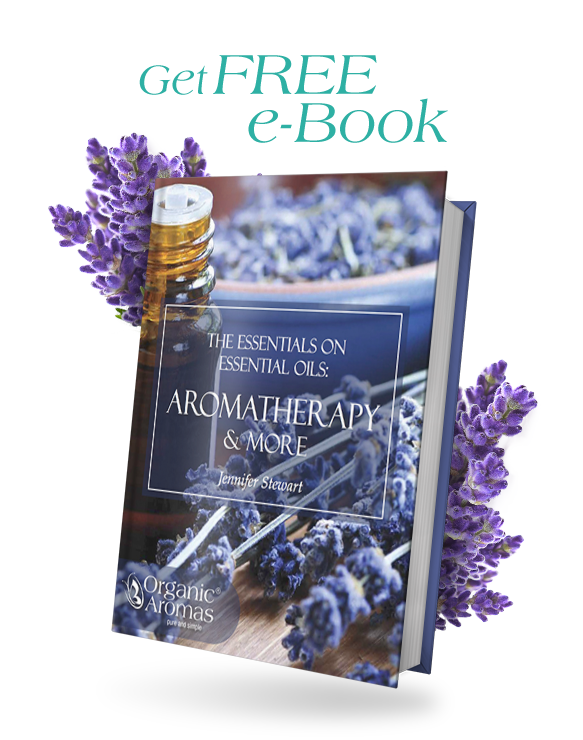
Sign Up to Get Your FREE
e-Book Here…
Tea Tree Oil: A Versatile Antiseptic
Tea tree oil, derived from the Melaleuca alternifolia tree, is a natural powerhouse with broad-spectrum antimicrobial attributes. It’s no wonder that this essential oil has gained a reputation for keeping gums in top health, owing to its antibacterial and potential anti-inflammatory properties. Integrating tea tree oil into your dental routine can be as simple as adding a few drops to your toothpaste or concocting a homemade mouthwash to swish away the worries of oral infections.
Embracing the antiseptic prowess of tea tree oil doesn’t just maintain oral health; it actively defends against the microscopic threats that linger in the nooks and crannies of your mouth. The versatility of tea tree oil makes it a standout in the world of essential oils for healthy teeth and gums.
Peppermint Oil: Freshness and Healing Combined
Peppermint oil is the burst of cool freshness that can take your oral hygiene routine to the next level. Beyond its invigorating scent, peppermint oil harbors anti-inflammatory properties that provide a soothing touch to irritated gums. It’s the feeling of a crisp, clean breeze through your mouth with each swish and gargle, leaving your breath feeling fresh and your gums relieved.
The dual benefits of breath freshness and healing make peppermint oil a cherished component in the realm of oral health essential oils. Whether you’re looking to promote healing or simply enjoy that minty freshness, peppermint oil is a natural choice for a healthier smile.
Clove Oil: The Traditional Toothache Remedy
Clove oil is the traditional medicine’s answer to the modern toothache. Its rich antimicrobial properties and numbing effects have been relieving dental pain for centuries. With a drop of clove oil, the discomfort of a toothache is soothed, thanks to its analgesic properties. The antiseptic qualities of clove oil also make it an excellent ally in combating infections within the mouth.
Clove oil’s combination of analgesic and antiseptic effects supports the overall health of your teeth and gums, beyond just treating pain. As a traditional remedy with a long-standing history, clove oil remains a trusted natural solution to oral health problems. Some benefits of using clove oil for oral health include:
- Relieving toothache pain
- Reducing gum inflammation
- Fighting oral infections
- Freshening breath
- Promoting overall oral health
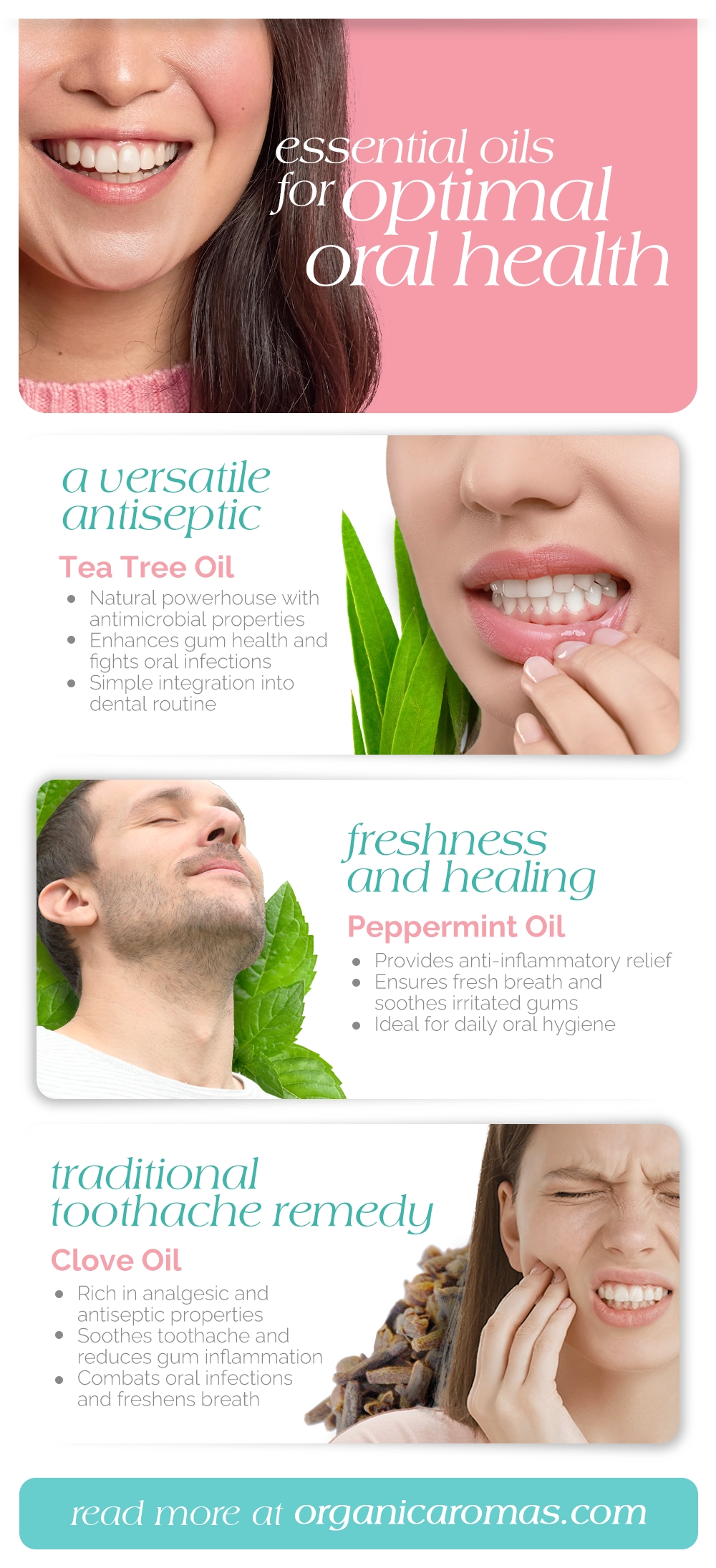
The Synergy of Oils and Oral Health
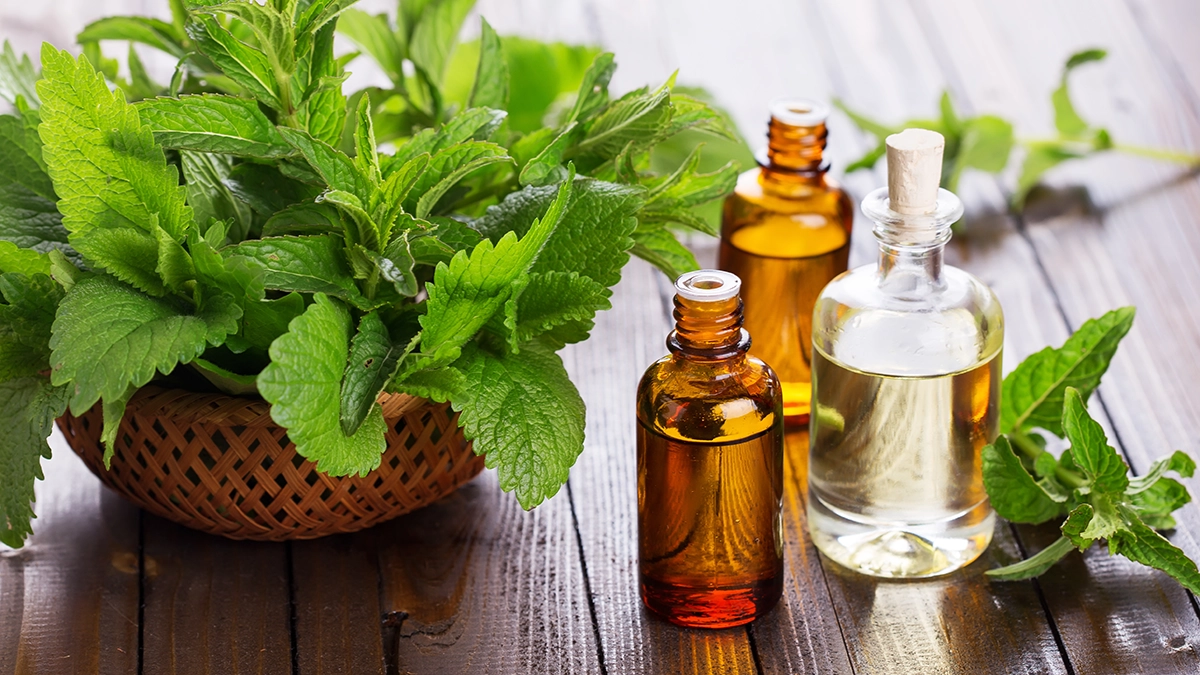
The synergy between essential oils and oral health is rooted in nature’s own medicine cabinet. These botanical extracts are not only fragrant but also come with a plethora of antibacterial qualities, particularly effective against the bacteria responsible for cavities and gum diseases. Imagine a world where oral infections are kept at bay with the same oils that might flavor your favorite dish or scent your living room.
From the spicy warmth of cinnamon to the refreshing zing of peppermint, essential oils like oregano, sweet basil, and tea tree are recognized for their antimicrobial properties, which help to mitigate the germs causing discomfort, diseases, and decay. Moreover, their anti-inflammatory benefits aid in reducing gum inflammation and promoting the healing of oral injuries or infections.
Combining Oils for Enhanced Effectiveness
When it comes to harnessing the full potential of essential oils for healthy gums, combining different varieties can amplify their benefits. Here are some essential oils that are advantageous for maintaining oral health:
- Echinacea
- Myrrh
- Tea tree oil
- Citrus-derived oils
A blend of echinacea, myrrh, and tea tree oils offers a formidable antimicrobial force. Citrus-derived oils further contribute to these effects with their antimicrobial and anti-inflammatory capabilities.
Mixing these powerful blends with a carrier oil like coconut or almond is a wise practice for direct application to the gums. This not only ensures a safe application but also enhances the soothing experience. Some essential oils that can be used for this purpose include:
- Clove oil, which has antimicrobial properties and can help relieve toothache
- Peppermint oil, which has a cooling effect and can freshen breath
- Tea tree oil, which has antibacterial properties and can help reduce gum inflammation
- Eucalyptus oil, with its ability to reduce gum inflammation, can also be part of this mix, either added to toothpaste or diluted in water for a refreshing mouthwash.
Creating Your Own Essential Oil Mouth Rinse
Concocting your own natural mouth rinse, blending the therapeutic properties of essential oils with the simplicity of water, can be quite satisfying. A DIY mouth rinse, infused with the antimicrobial prowess of echinacea tincture, myrrh, and tea tree essential oils, can be a potent weapon against oral bacteria. The preparation is straightforward: mix a few drops of your chosen essential oils with water, and you’ve got yourself a homemade remedy to maintain oral hygiene.
Like a chef crafting a gourmet sauce, you can experiment with the quantities, perhaps starting with 5-10 drops of essential oils per cup of water, finding the perfect blend for your personal preference and oral health needs.
Oil Pulling: An Ancient Practice for Modern Oral Hygiene

Step back in time and embrace oil pulling, an ancient practice that has found its place in the modern world of oral hygiene. The technique is as simple as it is profound: swish oil in your mouth for 15-20 minutes, drawing out bacteria and promoting a healthier oral environment. This traditional method goes beyond just cleaning; it’s about:
- fortifying your oral defenses
- whitening teeth
- freshening breath
- reducing harmful bacteria like streptococcus mutans
Coconut oil stands out as a favored choice for oil pulling, thanks to its inflammation-reducing properties and its knack for battling harmful bacteria, enhancing the practice’s oral health benefits.
The Role of Lauric Acid in Coconut Oil Pulling
At the heart of coconut oil’s effectiveness in oil pulling is lauric acid, a component celebrated for its antimicrobial properties. This acid is particularly adept at targeting the bacteria responsible for causing cavities, forging a protective shield for your teeth. Moreover, coconut oil’s lauric acid helps to keep gums moist, creating an environment that nurtures oral health and prevents the onset of decay.
Incorporating coconut oil into your oil pulling routine contributes to a robust oral health regimen and leverages the intrinsic antimicrobial properties of lauric acid to maintain a clean, healthy mouth.
Sesame Oil: Strengthening Gums Naturally
Sesame oil, another traditional oil revered for its oral health benefits, offers a natural pathway to stronger gums. Its anti-inflammatory properties help soothe and reduce inflammation, which is crucial for gum health. As inflammation wanes, sesame oil works its magic to fortify the gums, ensuring they are resilient against infection and disease.
Furthermore, sesame oil is known to improve blood flow to the gums, which is essential for delivering nutrients and removing toxins, thus enhancing oral health. When used in the practice of oil pulling, sesame oil aids in the detoxification process, pulling away toxins that might otherwise contribute to oral health problems.
Essential Oils and Gum Disease: A Natural Approach to Treatment

Gum disease, an adversary of dental health, can be confronted with the natural arsenal provided by essential oils. These botanical extracts are not merely for pleasant aromas; they wield the power to control bacterial growth, a vital factor in the prevention of periodontal disease. Regular use of essential oils, such as tea tree oil, can lead to a significant reduction in bacterial count within the deep pockets of gums, suggesting their potential in treating periodontal diseases.
Coconut oil, with its lauric acid content, offers anti-inflammatory and antimicrobial effects that are instrumental in reducing plaque and symptoms of gingivitis. Additionally, myrrh oil, with its antimicrobial properties, stimulates blood flow to gum tissue, thus contributing to gum healing and resilience against oral diseases.
Oregano Oil: Fighting Bacterial and Fungal Infections
Oregano oil, a potent essential oil, is highly regarded for its ability to combat oral infections and gum disease due to its strong antimicrobial properties. This oil is known for its effectiveness against bacterial and fungal infections, making it an invaluable natural remedy for various oral health issues.
Employing oregano oil in your oral care routine is akin to enlisting a seasoned warrior in the fight against bacteria and fungi. Its capabilities in inhibiting bacterial growth and fighting off oral pathogens underscore its role as an essential component of natural oral healthcare.
Clary Sage Oil: Reducing Inflammation and Promoting Healing
The gentle yet potent clary sage oil stands out for its anti-inflammatory properties, providing relief for those with inflamed gums. Its application can be particularly soothing for conditions such as periodontitis, where reducing inflammation is a key aspect of healing. In addition to its anti-inflammatory prowess, clary sage oil brings antifungal benefits to the table, assisting in healing inflamed gums and supporting the body’s immune response.
Embracing clary sage oil in your oral health routine is a step towards not only calming inflammation but also promoting healing within the mouth, ensuring your gums are cared for in a natural and effective manner.
Integrating Essential Oils into Your Dental Routine
Incorporating essential oils into your dental routine can be a transformative experience, but it’s important to do so with care and consistency. These powerful botanicals should be used in moderation to avoid any adverse effects, such as irritation or sensitivity. When applying essential oils to the gums or mixing them into your toothpaste, ensure that they are diluted with a carrier oil to mitigate any potential side effects.
Essential oils can also be creatively integrated into homemade oral care products, like toothpaste, that blend natural ingredients such as:
- olive oil extract
- clove
- thyme
- peppermint oil
Moreover, a few drops of essential oils can be added directly to your toothbrush, enhancing the fight against tooth decay and plaque.
To maintain toothbrush hygiene, consider soaking it in a solution mixed with peroxide and an essential oil, further supporting your oral health.
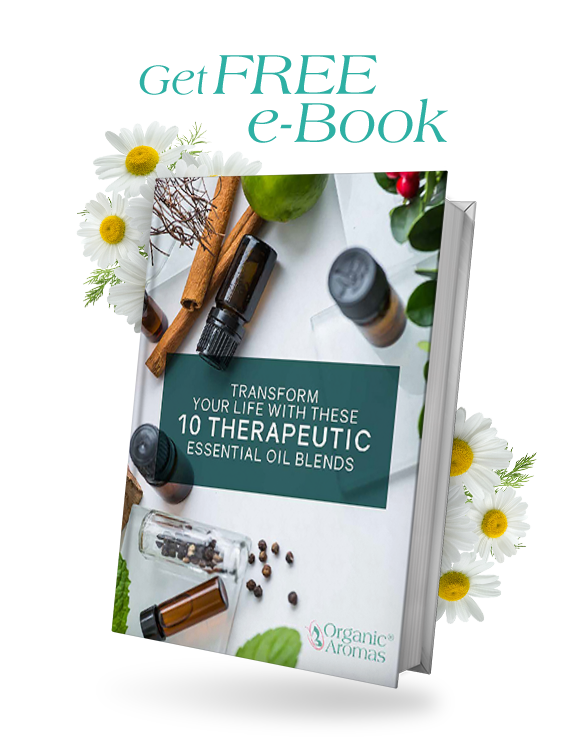
Sign Up to Get Your FREE Essential Oils e-Book Here
The Relationship Between Essential Oils and Systemic Diseases
Beyond oral health, essential oils like coconut and oregano oil may offer broader health benefits by reducing not only bacteria but also viruses and fungi in the mouth. Lauric acid, found abundantly in coconut oil, is particularly effective against bacteria, suggesting a protective effect against systemic diseases that may arise from oral infections. Oregano oil’s antimicrobial properties also contribute to its efficacy in combating a range of oral health issues, reinforcing the connection between a healthy mouth and a healthy body.
Understanding the relationship between essential oils and systemic diseases elevates the significance of oral health in overall wellness. By prioritizing oral hygiene and integrating essential oils, you may be taking a proactive step towards fortifying your immune system and preventing a variety of health conditions.
Expert Insights: What Dental Professionals Say About Essential Oils
Dental professionals recognize the potential of essential oils as supplementary care in the realm of oral health. While in-office procedures remain the primary treatment for conditions like receding gums, essential oils could serve as an additional layer of care, enhancing the healing process and overall oral hygiene.
Consulting with dental experts is vital when considering the use of essential oils, as they can provide tailored advice on how to best integrate these natural remedies with professional treatments. By doing so, you can ensure that you’re benefiting from the full spectrum of oral health care, combining the wisdom of traditional medicine with the advancements of modern dental science.
Precautions and Best Practices When Using Essential Oils for Oral Care

Prioritizing safety and effectiveness is paramount when venturing into the world of essential oils for oral care. Essential oils are potent and should never be ingested due to their potential toxicity. This is especially important to remember with oils like tea tree, which, while beneficial topically, can be harmful if swallowed. As such, opting for dental care products containing tea tree oil is a safer alternative to DIY oral care practices.
Before diving into DIY dental treatments with essential oils, thorough research is necessary. Not all oils are safe for ingestion, and some can cause harm if applied directly to the skin or gums without proper dilution. Always discuss any new or unconventional practices with a dentist, especially when it involves essential oils, to ensure they complement your regular brushing and flossing rather than disrupt it.
Essential Oils for Teeth and Gums: The Final Word on Natural Oral Care
In the quest for optimal oral health, essential oils emerge as a natural adjunct to traditional dental care. From tea tree oil’s antiseptic properties to the anti-inflammatory prowess of clary sage, these aromatic essences offer a world of benefits for your teeth and gums. By integrating essential oils into your oral care routine with mindfulness and consistency, you can harness their therapeutic powers to maintain oral health, combat gum disease, and even potentially bolster your overall wellness. Let the essence of nature be your ally in the pursuit of a radiant smile and robust oral health.

Join Our Exclusive Member Club to get Big Discounts!
Frequently Asked Questions
Can essential oils replace my regular toothpaste and mouthwash?
No, essential oils should not replace your regular toothpaste and mouthwash. Instead, incorporate them into your oral hygiene routine as a complement to traditional dental products.
How often can I use essential oils in my oral care routine?
You can use essential oils daily in your oral care routine, as long as they are properly diluted with a carrier oil or added to a homemade mouth rinse. It’s important to follow the guidance of a dental professional when incorporating essential oils into your routine.
- Jünger, H., Jaun-Ventrice, A., Guldener, K., Ramseier, C., Reissmann, D., & Schimmel, M., 2020. Anti-inflammatory potential of an essential oil-containing mouthwash in elderly subjects enrolled in supportive periodontal therapy: a 6-week randomised controlled clinical trial. Clinical Oral Investigations, 24, pp. 3203 – 3211.
- Leeuwen, M., Slot, D., & Weijden, G. (2014). The effect of an essential-oils mouthrinse as compared to a vehicle solution on plaque and gingival inflammation: a systematic review and meta-analysis.. International journal of dental hygiene, 12 3, 160-7

